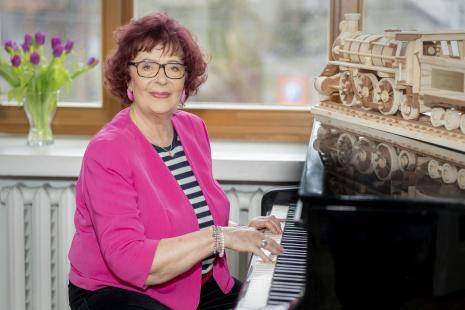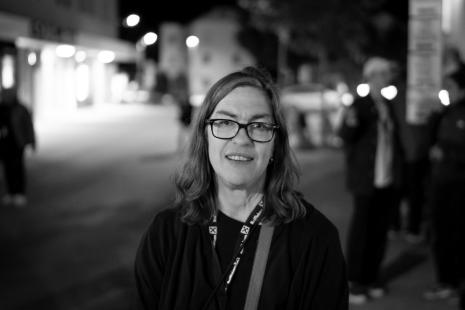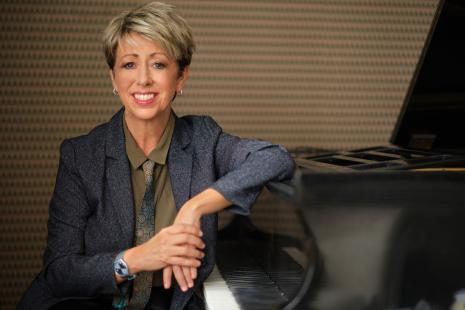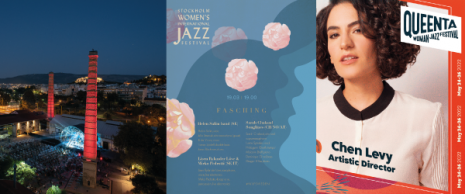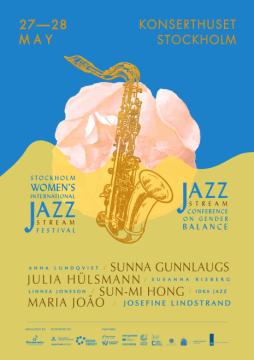Back to list
What advice would you give to aspiring sound engineers, particularly women?
My advice to people who want to be sound engineers, is that there are a range of skills that you use. You will learn the technical knowledge and skills but it’s also important to make the performer feel like all your heart and effort has gone into the performance. You have to love music, the sound and your job.
You almost have to be a psychologist, and you have to feel a resonance with the musician and anticipate their every move. If the musician is nervous, you calm them down and create a great atmosphere on the stage. Even if there’s a rush, I try not to catch a negative mood – it’s like a spiral or something – as it is hard to work with negative vibes.
Becoming a really good sound engineer needs hard work, lots of studying, tons of blood, sweat and tears, but in the end it’s worth it!
What challenges do you face as a female sound engineer in a male-dominated industry?
I have been thinking about this question a lot. When you are a new starter, you need to give 130% in your work. My theory is when you reach a professional level as a sound engineer as a woman, it becomes harder. Sometimes you get the impression that your male colleagues are afraid that you’re stealing their jobs or taking their territory. No-one says anything, but you start to feel there are places where you are not welcome anymore. You start getting out of the loop, out of the scope. It’s not overt, but you feel excluded.
There are male colleagues, on the other hand, who like the way I work and want to work more with me. For example, I’ve just met the Italian colleague who I worked with years before, and he told me how much he enjoyed working with me now and then.
There’s a Hungarian group called TAO, playing alternative dance-pop, smart pop in Hungarian. I’m now their sound engineer, because the leader of the band, who’s also the bass guitarist, loved the way I work on stage straight away.
There are also physical challenges especially when you are a beginner, for example, carrying heavy equipment or building festival staging from scratch. However, you won’t be good at your work, if you don’t know the steps of transforming a gig into a monumental show and if you don’t walk in people’s shoes working in different positions.
To tell the truth, you have to be on top of your game physically as well as mentally all the time to do a great job!
Is there anyone that's been a particular inspiration to you professionally?
I worked on a gig at Budapest Music Centre with Süse Ribeiro, a Portuguese sound engineer. She was the sound engineer for Maria João. (Ensemble Darcos + Maria João + Drumming GP at Budapest Music Center).
It was really inspiring to work with her and we cooperated really well together. She wrote a thank you for my attention and my dedication. It wasn’t an easy job to complete but we worked together brilliantly like we’d been doing it for years even though we hadn’t met before. We’re hoping we can work together in the future again.
At this concert I had another memorable moment with Maria João, with whom I had no personal contact during the soundcheck and the show. She thanked me for my professionalism after the gig because she really appreciated what I had made happen on that day with Süse. It’s really inspiring when musicians come off the stage after a gig and show appreciation for my work and/or thank me in front of the audience.
Links
Nóra's Facebook page
Opus Jazz Club
Photo credits
#WomenToTheFore 3: Nóra Szalóki
We talk to Nóra Szalóki, a sound engineer living in Budapest. As well as working with Opus Jazz Club at the Budapest Music Centre, Nóra is a freelancer, working with many bands and venues in Hungary and across Europe.
How long have you been working as a sound engineer and what inspired your interest?
I’ve been working as a sound engineer for about fifteen years. When I was about 13 years old, we had a school radio station, and it was me who didn't want to talk into the microphone. I was much more interested in how the equipment works.
Later, in high school, there was a band and we decided to make a recording on tape in the school radio studio. I was also doing the technical stuff for the high school radio. The band got bigger and when I was about 17 years old, I started to go with this band to small places for gigs. I did their sound without any relevant knowledge, and I got better over time.
After school I went in a different direction. I studied for a graduate diploma in economics and then spent a few years working as a media sales and marketing assistant.
What was your journey to become a professional? How did you begin your career?
There was a lucky moment when I met a guy at a party who was a sound engineer. I was working as a marketing assistant, but he knew I was interested in sound engineering and he offered me a chance to get closer to this world.
When I decided to change my job, I called him. I was keen to grab the opportunity to learn more, and that was how I became a trainee.
First it was all about cabling - lots of cabling - then learning about microphoning and audio lines on the stage. The venue was also a TV studio and I was given the opportunity to learn how to use the boom and wireless systems in TV shows. I learned more in three months than I’ve ever learned before.
There was a point when I had to decide whether to go back to the office, and then I was really lucky to be offered a job at the same place as my traineeship. After that came a five-year intense period when I was the youngest and least experienced of the technical crew, but I learned so much and started some smaller jobs on my own.
I got to learn the mixers and different equipment, and I worked in a variety of different contexts - children’s programmes, some theatre productions, in a TV studio, live music and some really cool little shows. Meanwhile I finished a vocational course in sound.
During the fifteen years, I’ve worked with lots of colleagues, with lots of musicians, and at lots of places and festivals. I’ve learned a lot from all these people. That’s how I became the sound engineer who I am now.
I feel lucky to have a wide range of experiences in live sound and I’m open to have a lot more, especially internationally!
How long have you been working as a sound engineer and what inspired your interest?
I’ve been working as a sound engineer for about fifteen years. When I was about 13 years old, we had a school radio station, and it was me who didn't want to talk into the microphone. I was much more interested in how the equipment works.
Later, in high school, there was a band and we decided to make a recording on tape in the school radio studio. I was also doing the technical stuff for the high school radio. The band got bigger and when I was about 17 years old, I started to go with this band to small places for gigs. I did their sound without any relevant knowledge, and I got better over time.
After school I went in a different direction. I studied for a graduate diploma in economics and then spent a few years working as a media sales and marketing assistant.
What was your journey to become a professional? How did you begin your career?
There was a lucky moment when I met a guy at a party who was a sound engineer. I was working as a marketing assistant, but he knew I was interested in sound engineering and he offered me a chance to get closer to this world.
When I decided to change my job, I called him. I was keen to grab the opportunity to learn more, and that was how I became a trainee.
First it was all about cabling - lots of cabling - then learning about microphoning and audio lines on the stage. The venue was also a TV studio and I was given the opportunity to learn how to use the boom and wireless systems in TV shows. I learned more in three months than I’ve ever learned before.
There was a point when I had to decide whether to go back to the office, and then I was really lucky to be offered a job at the same place as my traineeship. After that came a five-year intense period when I was the youngest and least experienced of the technical crew, but I learned so much and started some smaller jobs on my own.
I got to learn the mixers and different equipment, and I worked in a variety of different contexts - children’s programmes, some theatre productions, in a TV studio, live music and some really cool little shows. Meanwhile I finished a vocational course in sound.
During the fifteen years, I’ve worked with lots of colleagues, with lots of musicians, and at lots of places and festivals. I’ve learned a lot from all these people. That’s how I became the sound engineer who I am now.
I feel lucky to have a wide range of experiences in live sound and I’m open to have a lot more, especially internationally!
What drew you to live music?
I was open to work on all kinds of sound engineering, I didn’t want to specialise in the early part of my career. I was also open to do studio and recording work too. Now I particularly do front of house engineering or monitoring engineering. I love working live, working on stages.
I really love the moment when there's nothing on the stage, and I have to set up everything from scratch and make a really good experience for the musicians and for the audience. When it’s live, there is no tomorrow, and no yesterday. There's only here and now and I really love that. From nothing on the stage, it becomes something and everyone’s happy and enjoying what they’re doing. It makes it all worth it!
I always say to musicians when they arrive at the stage, if you are comfortable on the stage half of my job is done. If they love playing music on stage then it’s the miracle that helps me. If they’re not happy, neither the best equipment in the world nor all my skills will help.
What is your typical day like as a sound engineer?
I can be the front of house (FOH) engineer or monitoring engineer for live work and sometimes I do both, for example here at Opus Jazz Club.
First, I set up the stage, do the microphoning and then I’m working with Digico SD9. We record everything as documentation and I use ProTools for this, but I don’t work with the tracks after that. My role is in the live setting, not the recorded one.
As a freelancer, I’m open to do lots of different work. So, if I don’t have a gig on a particular day I might be working as a sound and video engineer on podcasts or videos (I do the live sound and scene rather than post-production). I also do some translation work, translating technical sound engineering materials from English to Hungarian.
Nowadays, on a busy day I start at 9am at the podcast studio making a videocast, then I work on translation at home, before a concert at Opus Jazz Club in the evening.
During Covid I realised that I needed to have a diverse range of work beside live sound. That’s why I became like a spider – with several different legs eg podcasts, translations, live music. I’ve also got familiar with lightning technical knowledge, so I have the skills to do a technical manager role in small clubs.
At other times, I might be touring with a band, including festivals. For example, on a Europe tour, I get on the bus and after a long journey I arrive somewhere and talk to the technical crew of the venue. We talk about the equipment and the possibilities, discuss the gig, some of which we’ve already emailed about.
Sometimes venue staff are less experienced, and I might have to do everything by myself. I once had to set up the whole PA system in a small club. But I have lots of good experience with crews and places where we all work together, and everything goes smoothly.
The largest gig I worked on as an FOH engineer was at a 4,000-capacity stadium in Marseille. As a monitor engineer, the largest venue was in Budapest with a capacity of 12,000. I usually work in smaller places and festivals as the resident technical manager and sound engineer.
I was open to work on all kinds of sound engineering, I didn’t want to specialise in the early part of my career. I was also open to do studio and recording work too. Now I particularly do front of house engineering or monitoring engineering. I love working live, working on stages.
I really love the moment when there's nothing on the stage, and I have to set up everything from scratch and make a really good experience for the musicians and for the audience. When it’s live, there is no tomorrow, and no yesterday. There's only here and now and I really love that. From nothing on the stage, it becomes something and everyone’s happy and enjoying what they’re doing. It makes it all worth it!
I always say to musicians when they arrive at the stage, if you are comfortable on the stage half of my job is done. If they love playing music on stage then it’s the miracle that helps me. If they’re not happy, neither the best equipment in the world nor all my skills will help.
What is your typical day like as a sound engineer?
I can be the front of house (FOH) engineer or monitoring engineer for live work and sometimes I do both, for example here at Opus Jazz Club.
First, I set up the stage, do the microphoning and then I’m working with Digico SD9. We record everything as documentation and I use ProTools for this, but I don’t work with the tracks after that. My role is in the live setting, not the recorded one.
As a freelancer, I’m open to do lots of different work. So, if I don’t have a gig on a particular day I might be working as a sound and video engineer on podcasts or videos (I do the live sound and scene rather than post-production). I also do some translation work, translating technical sound engineering materials from English to Hungarian.
Nowadays, on a busy day I start at 9am at the podcast studio making a videocast, then I work on translation at home, before a concert at Opus Jazz Club in the evening.
During Covid I realised that I needed to have a diverse range of work beside live sound. That’s why I became like a spider – with several different legs eg podcasts, translations, live music. I’ve also got familiar with lightning technical knowledge, so I have the skills to do a technical manager role in small clubs.
At other times, I might be touring with a band, including festivals. For example, on a Europe tour, I get on the bus and after a long journey I arrive somewhere and talk to the technical crew of the venue. We talk about the equipment and the possibilities, discuss the gig, some of which we’ve already emailed about.
Sometimes venue staff are less experienced, and I might have to do everything by myself. I once had to set up the whole PA system in a small club. But I have lots of good experience with crews and places where we all work together, and everything goes smoothly.
The largest gig I worked on as an FOH engineer was at a 4,000-capacity stadium in Marseille. As a monitor engineer, the largest venue was in Budapest with a capacity of 12,000. I usually work in smaller places and festivals as the resident technical manager and sound engineer.
Video: Recorded live at Opus Jazz Club. Live sound & recording engineer: Nóra Szalóki. Post-production mixing & mastering: Viktor Szabó.
What advice would you give to aspiring sound engineers, particularly women?
My advice to people who want to be sound engineers, is that there are a range of skills that you use. You will learn the technical knowledge and skills but it’s also important to make the performer feel like all your heart and effort has gone into the performance. You have to love music, the sound and your job.
You almost have to be a psychologist, and you have to feel a resonance with the musician and anticipate their every move. If the musician is nervous, you calm them down and create a great atmosphere on the stage. Even if there’s a rush, I try not to catch a negative mood – it’s like a spiral or something – as it is hard to work with negative vibes.
Becoming a really good sound engineer needs hard work, lots of studying, tons of blood, sweat and tears, but in the end it’s worth it!
What challenges do you face as a female sound engineer in a male-dominated industry?
I have been thinking about this question a lot. When you are a new starter, you need to give 130% in your work. My theory is when you reach a professional level as a sound engineer as a woman, it becomes harder. Sometimes you get the impression that your male colleagues are afraid that you’re stealing their jobs or taking their territory. No-one says anything, but you start to feel there are places where you are not welcome anymore. You start getting out of the loop, out of the scope. It’s not overt, but you feel excluded.
There are male colleagues, on the other hand, who like the way I work and want to work more with me. For example, I’ve just met the Italian colleague who I worked with years before, and he told me how much he enjoyed working with me now and then.
There’s a Hungarian group called TAO, playing alternative dance-pop, smart pop in Hungarian. I’m now their sound engineer, because the leader of the band, who’s also the bass guitarist, loved the way I work on stage straight away.
There are also physical challenges especially when you are a beginner, for example, carrying heavy equipment or building festival staging from scratch. However, you won’t be good at your work, if you don’t know the steps of transforming a gig into a monumental show and if you don’t walk in people’s shoes working in different positions.
To tell the truth, you have to be on top of your game physically as well as mentally all the time to do a great job!
Is there anyone that's been a particular inspiration to you professionally?
I worked on a gig at Budapest Music Centre with Süse Ribeiro, a Portuguese sound engineer. She was the sound engineer for Maria João. (Ensemble Darcos + Maria João + Drumming GP at Budapest Music Center).
It was really inspiring to work with her and we cooperated really well together. She wrote a thank you for my attention and my dedication. It wasn’t an easy job to complete but we worked together brilliantly like we’d been doing it for years even though we hadn’t met before. We’re hoping we can work together in the future again.
At this concert I had another memorable moment with Maria João, with whom I had no personal contact during the soundcheck and the show. She thanked me for my professionalism after the gig because she really appreciated what I had made happen on that day with Süse. It’s really inspiring when musicians come off the stage after a gig and show appreciation for my work and/or thank me in front of the audience.
Links
Nóra's Facebook page
Opus Jazz Club
Photo credits
- Bands Through The Lens
- Vivien Csakmag
- MammyPress Média
- Bálint Hrotkó / BMC
- Bálint Hrotkó / BMC
- Bálint Hrotkó / BMC
- Zoltán Ajtay
- János Nagy
- Nóra Szalóki
- Júlia Lily Hegyi

